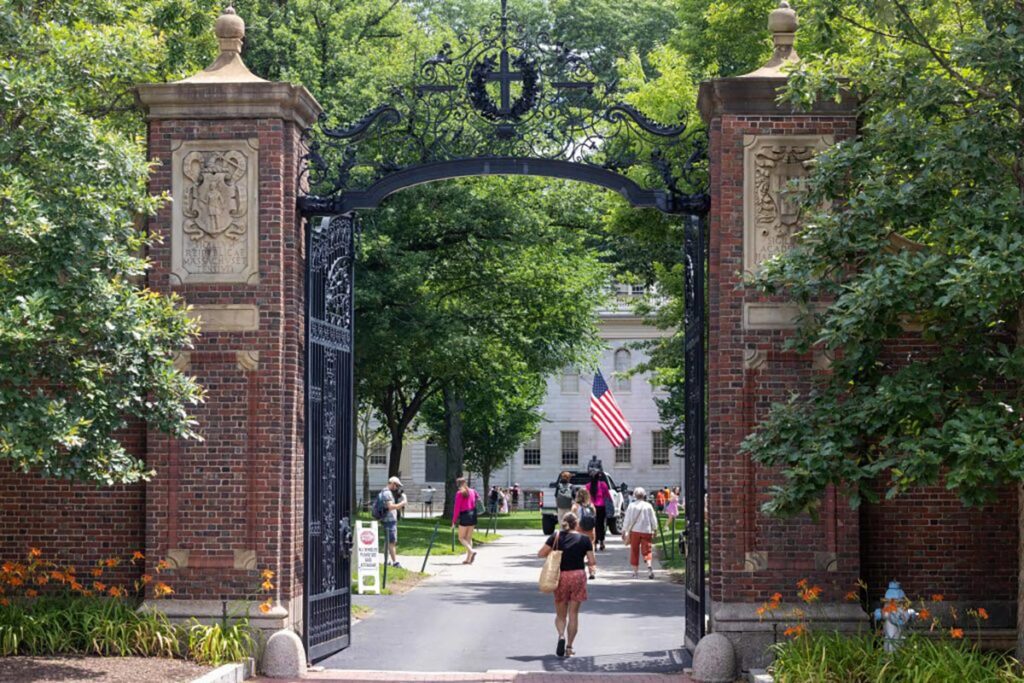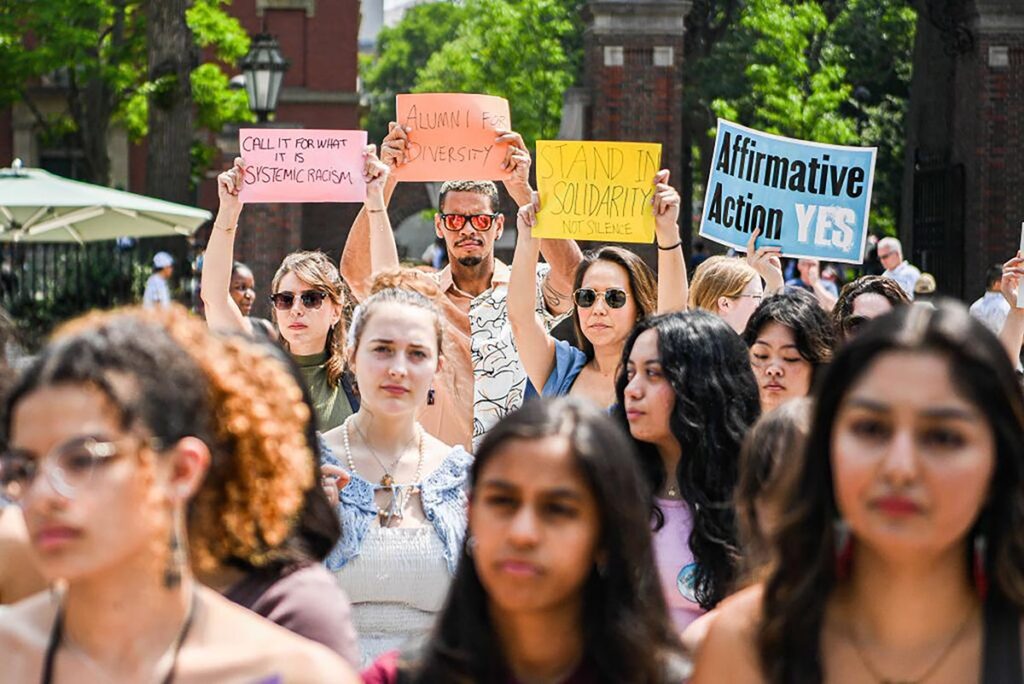If you’ve been following the news lately, you probably heard about the seismic U.S. Supreme Court decision overturning affirmative action programs. This means that race can no longer be an explicit factor in college admissions.
Justice Clarence Thomas, in his concurring opinion, wrote that such programs “fly in the face of our colorblind Constitution and our nation’s equality ideal.”
On the other side of the bench, Justice Sonia Sotomayor strongly disagreed, saying that the majority opinion undermines “the vision of equality embodied in the Fourteenth Amendment.”
In a surprising twist, the cases against affirmative action were pushed by an advocacy group who argued that such programs have their roots in anti-Jewish quotas during the 1920s.
Given that this argument played a critical role in the Supreme Court decision, this week, we wanted to unpack: Is affirmative action a Jewish value? What does this ruling mean for Jewish college applicants?
What is affirmative action?

But first, we need to make sure we’re on the same page. What is affirmative action?
According to Cornell University, affirmative action is “a set of procedures designed to eliminate unlawful discrimination among applicants, remedy the results of such prior discrimination, and prevent such discrimination in the future.”
It started with President John F. Kennedy’s Executive Order 10925, which required government contractors to “take affirmative action to ensure that applicants are employed…without regard to their race, creed, color or national origin.”
The policy took a significant step forward with the Civil Rights Act of 1964, and subsequent executive orders and Supreme Court rulings further shaped the understanding and implementation of affirmative action.
So, that’s a brief history, but who is included in these policies? Some groups are explicitly mentioned, like African Americans, Hispanics and Native Americans.
Other groups — including Asian Americans, Arab Americans, and Jewish Americans — fall into a complex category. They’re neither explicitly included nor excluded from affirmative action policies. It can depend on a range of factors — from how an individual identifies to how an institution interprets the policy. This is a complex issue, and there are no easy answers.
Jews and affirmative action: A brief history
So, why is the Jewish community caught up in this debate? To understand that, we need to take a step back in time.
In the early 20th century, Jewish students were increasing in number at elite institutions like Harvard. But instead of celebrating this academic success, some reacted with discriminatory quotas limiting Jewish participation in higher education.
For example, Harvard’s president in the 1920s, A. Lawrence Lowell, proposed a 15% quota for Jewish students. Other American and Canadian universities did the same.
These anti-Jewish quotas were a harsh reality and, sadly, accepted at the time. This left lasting scars on the Jewish community, making the debate around affirmative action particularly sensitive for many Jewish people today.
Is affirmative action a Jewish value?

So, is the principle of affirmative action — a tool to address both historical and ongoing discrimination — seen as a Jewish value?
In the wake of this new Supreme Court decision, what does this mean for Jewish students and the community at large?
First, let’s look at the broad arguments for and against the policy. The African American Policy Forum argues that “Race-conscious affirmative action remains necessary to address race-based obstacles that block the path to success of countless people of color of all classes.”
On the other hand, David Sacks and Peter Thiel describe affirmative action as “discriminating in favor of racial minorities…[racial] preferences primarily benefit minority applicants from middle- and upper-class backgrounds.”
Now, imagine you’re a Jewish high school student, watching this whole Supreme Court case unfold. You’re about to apply for college — what would this ruling mean for you?
As it turns out, Jewish perspectives on affirmative action are as diverse as the Jewish community itself.
There are groups like the Anti-Defamation League, for instance, who have expressed deep disappointment with the Supreme Court’s decision, criticizing it as a “fundamental misunderstanding of the history and present realities of racial discrimination.”
Liberal Jewish organizations like the Reform movement’s Religious Action Center have also voiced their disapproval. Rabbi Jonah Dov Pesner expressed concerns that “ignoring race” would “perpetuate racial injustice.”
On the other hand, the Louis D. Brandeis Center for Human Rights Under Law, applauded the ruling: “Today, Harvard discriminates against Asian Americans in admissions in the same manner in which it discriminated against Jews in the 1920s and 1930s.”
They argue that, in recent years, affirmative action policies have had the effect of excluding Asian and Jewish students. Statistics show the number of Jewish students at Ivy League schools has been dropping in recent years, a trend they attribute to the institutions’ increasing focus on diversity.
Others note that even if Jewish enrollment at the most selective schools is declining, Jewish students are still overrepresented considering they constitute just 2% of the population.
Mark Oppenheimer, the host of a podcast about the history of Jewish quotas at the Ivies, offered a nuanced perspective:
“Today I don’t think there’s anyone in college admissions who’s deliberately trying to squeeze Jews out…The quest for greater racial diversity makes it a little harder for many applicants who are perceived as white to get in.”
It’s more than an abstract debate — these questions directly affect students’ lives and the broader cultural fabric of our society, whether you’re in America or elsewhere.
The Brandeis Center believes that this decision will “create more opportunity for Jewish students to compete on a more level playing field” in the college admissions process. Others, however, view it as a step backward in the broader fight for racial equality.
According to a 2009 Quinnipiac poll, a slight majority, 43%, of Jews supported maintaining affirmative action, while 39% favored abolishing it. The remaining 18% were either undecided or unwilling to choose a side.
Initially, Jewish groups — including the ADL — were largely unified in opposing affirmative action due to their experience with Jewish admissions quotas and fear of their recurrence.
“Over time, the stances of American Jewish groups including the ADL and American Jewish Committee have shifted, a move that has been attributed to any number of causes [including] increasing alignment with politically liberal causes [and] recognition that quotas targeting Jewish students were not reinstated,” the Jewish Insider reported.
So, where does this complex debate leave us? Clearly, within the Jewish community, there’s a wealth of perspectives, each one significant in its own way. But let’s rise above the noise with these three takeaways:
1. There’s no singular Jewish “answer” to the question of affirmative action.
It’s tempting, but misleading, to cite Jewish sources to categorically argue that affirmative action is right or wrong. Jewish values can be interpreted to both support and oppose affirmative action.
Take Vayikra/Leviticus 19:15, for instance: “Do not show favoritism.” Depending on your perspective, this could be seen as advocating for or against affirmative action.
Then there’s the oft-cited Devarim/Deuteronomy 16:11, “Justice, justice, you shall pursue.” Everyone can agree with this in theory, but how we pursue justice, particularly in relation to affirmative action, might differ dramatically.
Let’s not forget that not all Jews are white-presenting — implying that affirmative action is either universally “good” or “bad” for Jews obscures the bigger picture.
Jewish diversity means affirmative action policies will affect different parts of our community in unique ways. For Jews of color, these policies could provide valuable opportunities. The bottom line is that there’s no one-size-fits-all Jewish answer to this question.
2. We need both “prophets” and “guardians.”
Rabbi David Cooper once suggested that the Jewish community is composed of “prophets” — those advocating for a more just and compassionate society — and “guardians,” who focus on the security of the Jewish people and preserving their traditions.
In the debate over affirmative action, some play the role of prophets, advocating for societal justice and aiding those held back by systemic discrimination. Others are more the guardians, concerned about the potential implications of such policies for Jewish, Asian or other communities.
Here’s the key: we need both the prophets and the guardians. It’s not about right or wrong, or good versus bad. Both roles are crucial for the fabric of society. It reminds us of the wise words of Hillel the Elder, “If I am not for myself, who will be for me? But if I am only for myself, what am ‘I’?” This balance, this tension between self-interest and broader justice, can help guide us through complex issues like affirmative action.
Here’s a challenge: If you typically align with the “prophet” worldview, try to step into the shoes of a “guardian.” And if you resonate more with the guardian perspective, try viewing the situation through the prophet’s lens. This could be a pivotal first step toward a more productive dialogue.
3. We must foster a Torah of conversation.
Debate and discourse have always been an integral part of our tradition. The Talmud, a compendium of Jewish law and tradition, is essentially a record of debates and discussions among rabbis over several centuries.
This tradition calls us to engage with the topic of affirmative action, not with the aim to arrive at a singular, absolute answer, but to deeply understand the many perspectives that exist within our community. There is no one Jewish voice on affirmative action — and that’s OK. Instead of seeking a monolithic Jewish view, let’s celebrate our diversity of thought.
This conversation isn’t just about the Supreme Court’s ruling or affirmative action. It’s about how we, as a community, engage with each other — how we handle disagreements, how we navigate the space between us when our opinions diverge. We need to be mindful that our words and our attitudes can either bridge gaps or deepen divisions.
In every conversation, we have the opportunity to choose respect over resentment, curiosity over judgment, understanding over intolerance. By doing so, we honor not only the traditions that value discourse, but also the principle of empathy that underpins any strong community. In the process, we not only broaden our own perspectives, but also strengthen the ties that hold us together as a community.
